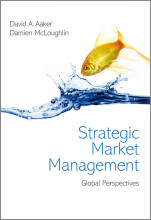Summary: The Economics Of Money, Banking, And Financial Markets | 9780321599797 | Frederic Mishkin
- This + 400k other summaries
- A unique study and practice tool
- Never study anything twice again
- Get the grades you hope for
- 100% sure, 100% understanding
Read the summary and the most important questions on The economics of money, banking, and financial markets | 9780321599797 | Frederic Mishkin.
-
8 Economic Analysis of Financial Structure
-
Why are banks needed to create an efficient economy? How is our financial structure designed to promote economic efficiency?
A health economy requires a financial system that moves funds from people who save to people who have productive investment opportunities. [...] -
8.1 Basic facts about financial structure throughout the world
This is a preview. There are 2 more flashcards available for chapter 8.1
Show more cards here -
Three sources of external funds for non-financial companies
- bank credit (loans from deposit institutions)
- trade credit (credit extended from one company to the other)
- other (informal sources (venture)
-
1. Why is the stock market less important than other sources of financing in most countries?
- Because adverse selection influences the financial structure (the lemons problem).The presence of the lemons problem keeps securities markets such as the stock and bond market form being effective in channeling funds form savers to borrowers.
- Because monitoring (required to overcome the principal agent problem) is very expensive, investors might be reluctant and the moral hazard (excessive risk taking management) costs will be high, making it hard for firms to issue equities.
- Because adverse selection influences the financial structure (the lemons problem).The presence of the lemons problem keeps securities markets such as the stock and bond market form being effective in channeling funds form savers to borrowers.
-
2.Why don't businesses use marketable securities more extensively to finance their activities?
Because adverse selection influences the financial structure (the lemons problem). -
3.Why are financial intermediaries and indirect finance so important in financial markets? In recent years, indirect finance has been declining in importance, why is this happening?
- The presence of transaction costs in financial markets explains in part why financial intermediaries and indirect finance play such an important role in financial markets. The role of information in financial markets is also vey important. Additionally intermediaries have the ability to avoid the free-rider problem in the face of moral hazard (example of venture capital firms as intermediaries. Venture capitalist take seat in the board of directors of the firms they invest in, and funds raised by venture capitalist are only marketable to the investors in the fund, thus excluding free riding.
-
4.What makes banks so important to the workings of the financial system?Although banks remain important, their share of external funds for businesses has declined in recent years. What is driving this decline?
- Banks overcome the asymmetric information problem of adverse selection
- Banks overcome the asymmetric information problem of adverse selection
-
5.Why are financial markets so extensively regulated though out the world?
- The asymmetric information problem of adverse selection in financial markets helps to explain why financial markets are so heavily regulated. Government regulation to increase information for investors is needed to reduce the adverse selection problem, which interferes with the efficient functioning of securities(stock and bond) markets.
- As with adverse selection, the government has an incentive to reduce the moral hazard problem created by asymmetric information.
- The asymmetric information problem of adverse selection in financial markets helps to explain why financial markets are so heavily regulated. Government regulation to increase information for investors is needed to reduce the adverse selection problem, which interferes with the efficient functioning of securities(stock and bond) markets.
-
6.Why do only large, well-known corporations find it easier to raise funds in securities markets?
The better know a company is, the more information about its activities is available in the market place. Thus it is easier for investors to evaluate the quality of the corporation and determine whether it is a good firm or a bad one. Because their is less of an adverse selection problem, investors are willing to invest directly in securities. -
7.Why is collateral such an important feature of debt contracts?
The presence of adverse selection in credit markets. Net worth (equity capital) can perform a similar role to collateral. If a firm has a high net worth, then even they have a cushion for potential losses of investments. Thus only people shoe don't need money can borrow it. -
8.2 Transaction costs
This is a preview. There are 1 more flashcards available for chapter 8.2
Show more cards here -
Why are transaction costs a major problem in financial markets?
- If you have only small funds available, transaction costs prevent you from trading in the financial market. Costs are higher than margins.
- If you have small funds available you cannot diversify, a lot of small transactions would result in high transaction costs
- Higher grades + faster learning
- Never study anything twice
- 100% sure, 100% understanding
Topics related to Summary: The Economics Of Money, Banking, And Financial Markets
-
Economic Analysis of Financial Structure - The lemons problem: how adverse selection influences financial structure
-
Economic Analysis of Financial Structure - How moral hazard affects the choose between debt and equity contracts
-
Economic Analysis of Financial Structure - Conflicts of interest
-
Financial Crisis and Subprime meltdown
-
Banking and the Management of Financial Institutions
-
Economic Analysis of Financial Regulation
































